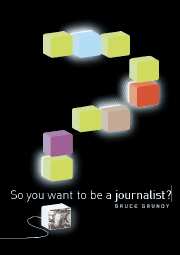Book contents
- Frontmatter
- Contents
- Acknowledgments
- Introduction
- Part 1 Getting started in journalism
- Part 2 Writing skills
- 5 Grammar
- 6 Spelling and punctuation
- 7 Subbing
- 8 Basic newspaper layout and design
- Part 3 Understanding the law
- Part 4 Research skills
- Part 5 Being professional in journalism
- Bibliography
- Further reading
- Index
6 - Spelling and punctuation
Published online by Cambridge University Press: 05 June 2012
- Frontmatter
- Contents
- Acknowledgments
- Introduction
- Part 1 Getting started in journalism
- Part 2 Writing skills
- 5 Grammar
- 6 Spelling and punctuation
- 7 Subbing
- 8 Basic newspaper layout and design
- Part 3 Understanding the law
- Part 4 Research skills
- Part 5 Being professional in journalism
- Bibliography
- Further reading
- Index
Summary
Like grammar, correct spelling and punctuation are necessary if you want to communicate with your reader. Some argue that these things are becoming more fluid and that journalists can move with the times; others argue that all writers, journalists included, should be “guardians” of standards. I argue that journalists should take the trouble to write clear, engaging text, to ensure that readers will read their work … and understand it.
Spelling
Now we have reached a minefield. Transgressions abound in the media. In some cases there are handy rules to help the poor speller. But in almost all cases there are exceptions to the rules. Then there are those words that sound the same but are spelled very differently and mean very different things. Use one in the wrong context and your readers will be scratching their heads over your meaning, laughing, or sneering. Do you want any of these reactions?
The right word in the right place
What follows is simply a list of examples to prove the point that you have to know how to spell, or if you are not a good speller, that you have to know your weakness. In such a case you will need to have a good dictionary close by if you want to keep your reputation as a credible writer intact. The list is not exhaustive. It is illustrative only.
- Type
- Chapter
- Information
- So You Want To Be A Journalist? , pp. 155 - 170Publisher: Cambridge University PressPrint publication year: 2007



